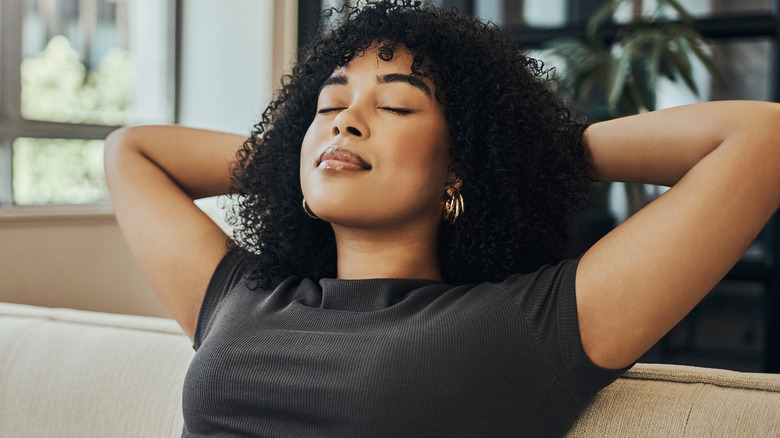When You Nap Every Day, Here's What Happens To Your Brain
Napping is a guilty pleasure we don't often talk about. When you're a toddler, you're put to bed during the day; when you're older, post-lunch siestas might even become a regular thing. As it turns out, napping can do more good than give you that quick pick-me-up when you need it.
A 2016 study published in The Journal of the American Geriatrics Society found a link between 30-to-90-minute naps after lunch and better cognitive function. The research involved analyzing self-reported data about napping from 2,974 people in China, aged 65 and older. The participants were grouped into non-nappers, short nappers (less than 30 minutes), moderate nappers (30 to 90 minutes), and extended nappers (more than 90 minutes). Attention, episodic memory, and visuospatial abilities were assessed. Moderate nappers performed better overall, while non-nappers showed poorer cognitive capabilities than short nappers.
This study is just one of many that looked into the benefits (and drawbacks) of daytime napping. Interestingly, the world of science seems divided on just how good siestas can be for your brain. For example, a 2022 study published in Alzheimer's & Dementia linked daytime siestas with a greater risk of Alzheimer's, while a 2021 study published in BMC Geriatrics on daytime naps and cognitive decline found that under-30-minute siestas reduced the risk. Moving away from cognitive function, naps apparently have a surprising link to brain mass, too.
The connection between naps and brain volume
A 2023 study in Sleep Health analyzed the data of 35,080 people aged 40 to 69 from a U.K. Biobank study. Researchers found a link between frequent daytime napping and as much as 15.8 cm3 (cubic centimeters) increase in total brain volume. That's 2.5 to 6.5 years of aging.
The study didn't examine cognitive performance, but it used a randomized research method focused on genetics called Mendelian randomization, which looked at DNA samples and brain scans of the participants. As explained by Valentina Paz, lead author and researcher at the University of the Republic of Uruguay and University College London (UCL), "By looking at genes set at birth, Mendelian randomisation avoids confounding factors occurring throughout life that may influence associations between napping and health outcomes. Our study points to a causal link between habitual napping and larger total brain volume." This study has faced its share of criticism, however, with some experts critiquing its lack of accurate data regarding napping length and others pointing to the absence of cognitive evaluation. Moreover, correlation doesn't necessarily mean causation.
While we may not know exactly what happens to the size of your brain when you snooze on the couch after a hearty pasta salad lunch, what we do know is that taking a nap or choosing not to is a very subjective thing, which brings us to the next set of questions: Should you be napping? And if so, for how long?
How to do napping right (for your brain)
While some might swear they need naps to keep their energy levels consistent through the day, others say stealing away for a quick snooze makes them feel lethargic after, not to mention messing with their nighttime sleep. All of these are valid points. Ultimately, how you feel after a daytime nap can be crucial in determining whether or not you should be napping, according to sleep medicine specialist Dr. Yonatan Greenstein (per Health).
The duration of your lie-down matters, too. While some recommend keeping it between 5 and 15 minutes, others say that anywhere between 20 and 90 minutes is okay. The goal is to give yourself enough time to rest without going so deep into a sleep cycle that you wake up with a confused brain. Sticking to a consistent time when you nap every day can also help. The best time happens to be early afternoon, according to most experts; it's not too close to your actual bedtime and also fits into that nice pocket in the day when you feel a yawn coming on after lunch. Find a quiet and dark room, and make your nap time intentional.
That being said, if you're overly reliant on naps to get through the day or taking longer naps, you are likely not sleeping well at night, or you might even have an underlying health condition. It might be time to see a doctor about your sleep habits.



